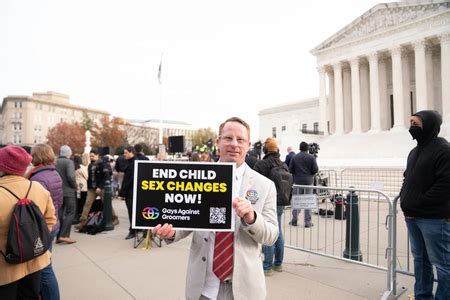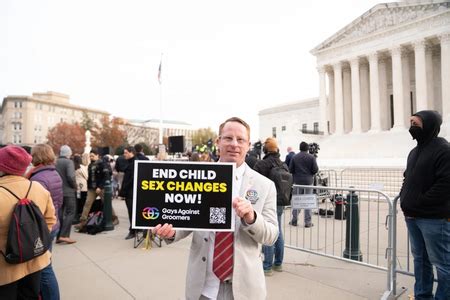
A young woman who detransitioned is applauding recent Supreme Court decisions related to gender transition care for minors, viewing them as crucial steps in protecting vulnerable youth from irreversible medical procedures. Chloe Cole, who began transitioning at age 13 and later detransitioned, has become a vocal advocate against gender-affirming care for minors, expressing deep regret over her own experiences.
Chloe Cole, now a prominent voice in the detransitioning community, expressed her support for the Supreme Court’s interventions regarding youth gender transition care, emphasizing the need to protect young people from potentially irreversible medical interventions. Cole, who began her transition at age 13 and later detransitioned, has become a vocal advocate against what she describes as premature and inadequately considered gender-affirming care for minors.
Cole’s journey began in her early teens when, struggling with feelings of discomfort in her body, she began identifying as male. She then sought medical intervention, starting with puberty blockers at age 13, followed by testosterone treatments and, at age 15, a double mastectomy. However, after a period of reflection and growing doubts, Cole decided to detransition, a process she has described as physically and emotionally challenging.
In her statements following the Supreme Court rulings, Cole highlighted the potential for long-term physical and psychological harm associated with medical interventions such as hormone therapy and surgeries. “These procedures are not reversible in many cases, and young people often do not have the cognitive maturity to fully understand the implications of these decisions,” Cole stated.
The specific Supreme Court cases that have drawn Cole’s attention involve challenges to state laws restricting or banning gender-affirming care for minors. While the Supreme Court has not issued a definitive ruling on the constitutionality of such laws, their decisions to allow certain state bans to remain in effect while legal challenges proceed have been viewed by Cole and other detransitioners as a positive sign. These legal battles are centered on the balance between parental rights, the rights of transgender individuals, and the state’s interest in protecting children.
Cole has also been actively involved in raising awareness about the detransitioning experience. She has testified before state legislatures, shared her story in media interviews, and engaged with online communities to provide support for others who are questioning or regretting their gender transitions. Her advocacy focuses on the importance of thorough psychological evaluations, parental involvement, and a cautious approach to medical interventions for gender dysphoria in young people.
Cole’s case underscores the growing debate surrounding gender-affirming care for minors, with passionate arguments coming from both sides. Supporters of gender-affirming care argue that it is a medically necessary and life-saving treatment for transgender youth, reducing the risk of suicide and improving mental health outcomes. They point to guidelines from medical organizations such as the American Academy of Pediatrics and the Endocrine Society, which support gender-affirming care when provided in accordance with established protocols.
Critics, like Cole, emphasize the potential for regret and the lack of long-term studies on the effects of hormone therapy and surgeries on developing bodies and minds. They argue that young people struggling with gender dysphoria should receive comprehensive mental health support to explore their feelings and address any underlying issues before making irreversible medical decisions.
The debate also involves questions of parental rights. Some argue that parents have the right to make medical decisions for their children, including decisions about gender-affirming care. Others contend that the state has a responsibility to protect children from potentially harmful medical interventions, particularly when those interventions are controversial and lack a strong scientific consensus.
Chloe Cole’s experience has contributed significantly to this complex and emotionally charged discussion. Her advocacy provides a unique perspective, highlighting the potential downsides of gender-affirming care and the importance of a cautious and individualized approach to treating gender dysphoria in young people. While her views are not universally shared, they have resonated with many who believe that more safeguards are needed to protect vulnerable youth from making irreversible medical decisions that they may later regret. The ongoing legal and political battles surrounding gender-affirming care for minors reflect the deep divisions in society over this issue, and the voices of detransitioners like Chloe Cole will continue to play a significant role in shaping the debate. Her story serves as a potent reminder of the complexities inherent in navigating gender identity and the profound implications of medical interventions aimed at aligning one’s physical appearance with one’s internal sense of self.
The impact of Cole’s advocacy extends beyond legal and political arenas. She has also become a figure of hope and support for individuals who are questioning or regretting their gender transitions. Through online platforms and support groups, she provides a space for detransitioners to share their experiences, connect with others who understand what they are going through, and access resources for physical and emotional healing.
The issue of youth gender transition care is further complicated by the influence of social media and online communities. Young people are increasingly exposed to information and narratives about gender identity through online platforms, which can both support and complicate their understanding of themselves. While online communities can provide a sense of belonging and validation for transgender youth, they can also expose them to misinformation and pressure to conform to certain gender identities or pursue medical interventions without fully understanding the risks and benefits.
In light of these complexities, many experts are calling for a more nuanced and comprehensive approach to addressing gender dysphoria in young people. This approach would involve thorough psychological evaluations, individualized treatment plans, and ongoing support for both the young person and their family. It would also prioritize mental health care and address any underlying issues that may be contributing to the young person’s gender dysphoria.
Chloe Cole’s story underscores the importance of careful consideration and informed consent in all medical decisions, particularly those involving irreversible interventions. Her advocacy serves as a powerful reminder that young people deserve the opportunity to explore their identities and make informed choices about their bodies and futures, free from pressure or coercion.
The debate over youth gender transition care is likely to continue for the foreseeable future, as societies grapple with evolving understandings of gender identity and the rights of transgender individuals. The voices of detransitioners like Chloe Cole will continue to shape this debate, providing valuable insights into the complexities of gender transition and the potential for regret. Their stories serve as a call for caution, compassion, and a commitment to protecting the well-being of all young people, regardless of their gender identity.
Cole argues that a more cautious approach is necessary, emphasizing the importance of thorough psychological evaluations and exploring all available options before considering medical interventions. She believes that many young people who identify as transgender may be struggling with underlying mental health issues or social pressures that contribute to their gender dysphoria, and that these issues should be addressed before pursuing irreversible medical procedures.
Cole’s activism has faced both praise and criticism. Supporters applaud her courage in sharing her story and raising awareness about the potential downsides of gender-affirming care, while critics accuse her of promoting a harmful anti-transgender agenda and undermining the rights of transgender youth to access medical care.
Cole, however, maintains that her advocacy is motivated by a genuine concern for the well-being of young people and a desire to prevent others from experiencing the regret and pain that she has endured. She believes that it is essential to have open and honest conversations about the risks and benefits of gender-affirming care, and to ensure that young people have access to comprehensive mental health support and unbiased information before making life-altering decisions.
The legal landscape surrounding gender-affirming care for minors remains uncertain, with ongoing legal challenges and varying state laws. The Supreme Court’s involvement in these cases underscores the significance of the issue and the potential for future rulings that could have far-reaching implications. As the debate continues, the voices of detransitioners like Chloe Cole will continue to play a crucial role in shaping the conversation and informing policy decisions.
The case of Chloe Cole highlights the complexities inherent in navigating gender identity, particularly during adolescence. It underscores the importance of providing young people with comprehensive support, accurate information, and the space to explore their identities without pressure or coercion. As societies grapple with evolving understandings of gender and the rights of transgender individuals, it is essential to approach these issues with compassion, empathy, and a commitment to protecting the well-being of all young people.
Further Context and Analysis
Chloe Cole’s journey and advocacy occur within a broader societal context marked by increasing visibility and acceptance of transgender individuals, alongside growing debates about the appropriate medical and social interventions for those experiencing gender dysphoria, particularly minors. The debate centers around the balance between supporting transgender youth in their affirmed gender identities and ensuring they receive appropriate medical and psychological care while safeguarding them from potentially irreversible decisions they may later regret.
Supporters of gender-affirming care emphasize its potential to alleviate the significant distress and mental health challenges faced by transgender youth. They argue that timely medical interventions, such as puberty blockers and hormone therapy, can reduce the risk of suicide, anxiety, and depression. They point to established medical guidelines and research suggesting that gender-affirming care improves the overall well-being of transgender individuals. These medical interventions are often part of a broader therapeutic approach involving psychological counseling, social support, and family involvement.
However, critics like Chloe Cole raise concerns about the lack of long-term studies on the effects of gender-affirming care, particularly on the developing brains and bodies of young people. They also emphasize the potential for regret and the challenges of detransitioning, highlighting the need for thorough psychological evaluations and a cautious approach to medical interventions. They also argue that some young people may be influenced by social trends or peer pressure to identify as transgender, and that more time and exploration may be needed before making irreversible decisions.
The debate also involves questions of parental rights and the role of the state in protecting children. Some argue that parents have the right to make medical decisions for their children, including decisions about gender-affirming care. Others contend that the state has a responsibility to protect children from potentially harmful medical interventions, particularly when those interventions are controversial and lack a strong scientific consensus.
The legal landscape surrounding gender-affirming care for minors is complex and evolving. Several states have passed laws restricting or banning certain medical interventions for transgender youth, while others have enacted laws protecting access to gender-affirming care. These laws are often challenged in court, raising constitutional questions about equal protection, due process, and freedom of speech. The Supreme Court’s involvement in these cases underscores the significance of the issue and the potential for future rulings that could have far-reaching implications.
The experiences of detransitioners like Chloe Cole provide valuable insights into the complexities of gender transition and the potential for regret. Their stories highlight the importance of individualized care, thorough psychological evaluations, and informed consent in all medical decisions. They also underscore the need for greater understanding and support for individuals who are questioning or regretting their gender transitions.
The issue of youth gender transition care is further complicated by the influence of social media and online communities. Young people are increasingly exposed to information and narratives about gender identity through online platforms, which can both support and complicate their understanding of themselves. While online communities can provide a sense of belonging and validation for transgender youth, they can also expose them to misinformation and pressure to conform to certain gender identities or pursue medical interventions without fully understanding the risks and benefits.
In light of these complexities, many experts are calling for a more nuanced and comprehensive approach to addressing gender dysphoria in young people. This approach would involve thorough psychological evaluations, individualized treatment plans, and ongoing support for both the young person and their family. It would also prioritize mental health care and address any underlying issues that may be contributing to the young person’s gender dysphoria.
The case of Chloe Cole highlights the importance of careful consideration and informed consent in all medical decisions, particularly those involving irreversible interventions. Her advocacy serves as a powerful reminder that young people deserve the opportunity to explore their identities and make informed choices about their bodies and futures, free from pressure or coercion.
The debate over youth gender transition care is likely to continue for the foreseeable future, as societies grapple with evolving understandings of gender identity and the rights of transgender individuals. The voices of detransitioners like Chloe Cole will continue to shape this debate, providing valuable insights into the complexities of gender transition and the potential for regret. Their stories serve as a call for caution, compassion, and a commitment to protecting the well-being of all young people, regardless of their gender identity.
The Broader Implications
The implications of Chloe Cole’s story and the broader debate surrounding gender-affirming care for minors extend beyond individual experiences and medical interventions. They touch upon fundamental questions about identity, autonomy, and the role of the state in protecting vulnerable populations. The debate reflects a clash of values and beliefs about gender, sexuality, and the rights of children.
On one side, there is a strong emphasis on individual autonomy and the right to self-determination. Supporters of gender-affirming care argue that transgender individuals should have the right to define their own identities and make decisions about their bodies, free from interference or discrimination. They believe that denying transgender youth access to gender-affirming care can have devastating consequences for their mental health and well-being.
On the other side, there is a concern for the potential harm that medical interventions may cause, particularly when those interventions are irreversible and lack long-term data. Critics of gender-affirming care argue that young people may not have the cognitive maturity to fully understand the implications of these decisions, and that they should be protected from making choices that they may later regret. They also emphasize the importance of parental rights and the role of the state in safeguarding the well-being of children.
The debate also raises questions about the role of medical professionals in providing gender-affirming care. Some argue that medical professionals have a duty to provide evidence-based care that is in the best interests of their patients. Others contend that medical professionals should be cautious about providing interventions that are controversial or lack a strong scientific consensus.
The legal and political battles surrounding gender-affirming care for minors reflect these conflicting values and beliefs. State laws restricting or banning certain medical interventions for transgender youth are often based on concerns about protecting children from harm, while laws protecting access to gender-affirming care are often based on principles of equality and non-discrimination.
The Supreme Court’s involvement in these cases underscores the significance of the issue and the potential for future rulings that could have a profound impact on the lives of transgender youth and their families. The Court’s decisions will likely shape the legal landscape surrounding gender-affirming care for years to come.
Conclusion
Chloe Cole’s story and the broader debate surrounding gender-affirming care for minors are complex and multifaceted. There are no easy answers, and there are passionate arguments on both sides. The issue raises fundamental questions about identity, autonomy, and the role of the state in protecting vulnerable populations. As societies grapple with evolving understandings of gender and the rights of transgender individuals, it is essential to approach these issues with compassion, empathy, and a commitment to protecting the well-being of all young people, regardless of their gender identity. The voices of detransitioners like Chloe Cole will continue to shape this debate, providing valuable insights into the complexities of gender transition and the potential for regret. Their stories serve as a call for caution, compassion, and a commitment to ensuring that all young people have the opportunity to explore their identities and make informed choices about their bodies and futures.
Frequently Asked Questions (FAQ)
-
What is gender-affirming care?
Gender-affirming care refers to medical, psychological, and social support services designed to help individuals align their lives and bodies with their gender identity. For transgender youth, this can include puberty blockers, hormone therapy, and surgeries. It also encompasses mental health counseling, social support, and legal assistance. The specific care provided varies depending on the individual’s age, stage of development, and personal needs. Major medical organizations such as the American Academy of Pediatrics and the Endocrine Society support gender-affirming care when provided in accordance with established guidelines.
-
What is detransitioning?
Detransitioning is the process of discontinuing or reversing gender transition. This may involve stopping hormone therapy, undergoing surgeries to reverse previous procedures, and/or changing one’s name and pronouns back to those associated with their sex assigned at birth. Individuals may choose to detransition for various reasons, including regret, health concerns, social pressure, or a change in their understanding of their gender identity.
-
Why is there controversy surrounding gender-affirming care for minors?
The controversy surrounding gender-affirming care for minors stems from concerns about the potential for regret, the lack of long-term studies on the effects of medical interventions, and questions about whether young people have the cognitive maturity to make informed decisions about irreversible medical procedures. Critics argue that more research is needed to understand the long-term risks and benefits of gender-affirming care, and that young people should receive thorough psychological evaluations before undergoing medical interventions. Supporters of gender-affirming care argue that it is a medically necessary and life-saving treatment for transgender youth, and that denying access to care can have devastating consequences for their mental health and well-being.
-
What is Chloe Cole’s stance on gender-affirming care for minors?
Chloe Cole is a vocal opponent of gender-affirming care for minors. Having detransitioned after undergoing medical interventions as a teenager, she believes that young people are often not equipped to make informed decisions about irreversible medical procedures. She advocates for thorough psychological evaluations, parental involvement, and a cautious approach to medical interventions for gender dysphoria in young people. Cole’s advocacy focuses on raising awareness about the potential downsides of gender-affirming care and supporting individuals who are questioning or regretting their gender transitions.
-
What are the legal implications of state laws restricting gender-affirming care for minors?
State laws restricting gender-affirming care for minors are often challenged in court, raising constitutional questions about equal protection, due process, and freedom of speech. Opponents of these laws argue that they discriminate against transgender youth and deny them access to medically necessary care. Supporters of the laws argue that they protect children from potentially harmful medical interventions. The Supreme Court’s involvement in these cases underscores the significance of the issue and the potential for future rulings that could have far-reaching implications. The legal landscape surrounding gender-affirming care for minors remains uncertain, with ongoing legal challenges and varying state laws.









